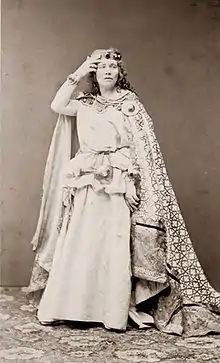Isolde (given name)
Isolde is a German feminine given name derived from either the Old High German words īs ("ice") and hiltja ("battle"), [2] or the Brythonic adsiltia ("she who is gazed upon").[3] The name was further popularized in Germany and German-speaking countries following the opera Tristan und Isolde composed by Richard Wagner between 1857 and 1859, and based on the 12th-century chivalric romance Tristan and Iseult.[4] Wagner subsequently had a daughter in 1865, who was named Isolde von Bülow.[5]
 Malvina Garrigues, Portuguese operatic soprano and first person in the role of Isolde in Richard Wagner's Tristan und Isolde (1865) | |
| Pronunciation | /ˌɪˈzɒldəˌɪˈsɒldə/ |
|---|---|
| Gender | Female |
| Language(s) | German |
| Name day | 23 August (Germany)[1] |
| Origin | |
| Meaning | īs ("ice") hiltja ("battle"). |
| Other names | |
| Variant form(s) | Iseult, Yseult, Ysolt, Isode, Isoude, Iseut, Iosóid, Esyllt, Isolda, Isotta, Izolda |
| Derived | Old High German or Brythonic |
People bearing the name Isolde include:
- Isolde Ahlgrimm (1914–1995), Austrian harpsichordist and fortepianist
- Isolde Barth (born 1948), German actress
- Isolde Eisele (born 1953), German rower
- Isolde Frölian (1908–1957), German gymnast
- Isolde Hausser (1889–1951), German physicist
- Isolde Kostner (born 1975), Italian alpine skier
- Isolde Kurz (1853–1944), German poet and short story writer
- Isolde Lasoen (born 1979), Belgian musician and singer
- Isolde Liebherr (born 1949), German-Swiss businessperson and entrepreneur
- Isolde Menges (1893–1976), English violinist
- Isolde Ries (born 1956), German politician
References
- "Germany Name Day". NameDayCalendar. 2019. Retrieved 12 October 2020.
- Mackensen, Lutz (27 June 1988). Das grosse Buch der Vornamen: Herkunft, Ableitungen und Verbreitung, Koseformen, berühmte Namensträger, Gedenk- und Namenstage, verklungene Vornamen. Ullstein. ISBN 9783548344256 – via Google Books.
- Bromwich, Rachel (November 15, 2014). Trioedd Ynys Prydein: The Triads of the Island of Britain. University of Wales Press. ISBN 9781783161478 – via Google Books.
- May, Thomas (2004). Decoding Wagner. Pompton Plains, New Jersey: Amadeus Press. ISBN 978-1-57467-097-4.
- "Exklusiv-Interview: die unbekannte Wagner-Urenkelin" (in German). inFranken.de. 8 August 2012. Retrieved 12 October 2020.
This article is issued from Wikipedia. The text is licensed under Creative Commons - Attribution - Sharealike. Additional terms may apply for the media files.